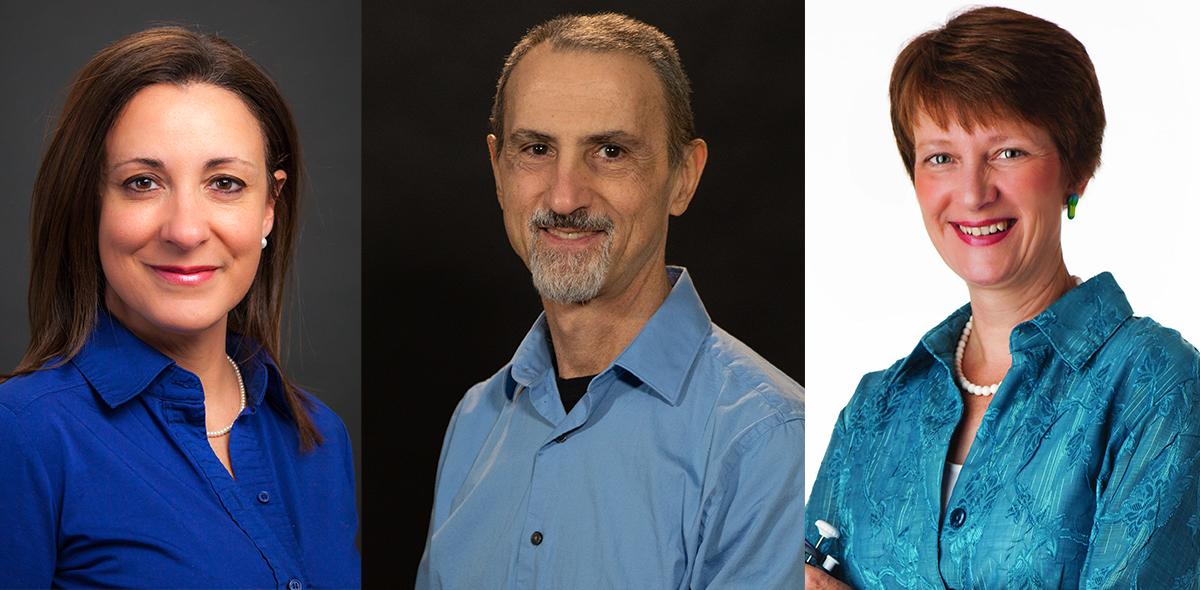Three Lawrence University professors will be featured in AP Daily, a new series of video lectures aimed at supporting high school students taking Advanced Placement (AP) courses in the midst of the pandemic.
The College Board launched the ongoing virtual series on YouTube when the COVID-19 pandemic forced high schools to go to remote learning. The free series features college professors lecturing on topics of their choice tied to AP course material.
Lawrence’s Beth De Stasio, the Raymond H. Herzog Professor of Science and professor of biology, and Gustavo Fares and Rosa Tapia, both professors of Spanish, were invited to join the series. All three jumped at the chance.
“Each lecturer is asked to speak on material that extends the content of a particular unit of the course,” De Stasio said. “I immediately said, ‘Yes,’ because, frankly, I just love to teach and to facilitate learning.”
By the time they’re all launched, more than 200 videos will be included, providing support and flexibility to AP students studying remotely. The release dates are staggered to coincide with each curricular unit during the school year. De Stasio, Fares, and Tapia expect their videos to post in the coming weeks.
More than 8.5 million students have already watched the AP Daily videos, said Cathy Brigham, senior director of academic outreach at the College Board.
“These videos are available both behind a password-protected site called AP Classroom, which AP students and teachers manage in their in-class interactions,” she said. “But the videos are also available to the public on YouTube. On YouTube alone, the videos from higher education faculty have been viewed over 34,500 times for the first four units of AP courses. We are launching videos in sequence with when students are experiencing that content live in their classrooms, and so the number of videos will grow over time.”
De Stasio and Tapia chair their respective AP test development committees, and Fares has done so in the past, so they are plenty familiar with the work of the College Board and the AP process. De Stasio also is on the Science Advisory Committee for the College Board.
Tapia has been actively involved with the AP Spanish Language and Culture program since 2007. As a leading expert on the AP Spanish exam, she has been invited to give talks and workshops to university educators and administrators across the country, most recently at a February symposium at Stanford University.
She is one of seven lecturers speaking in the Spanish Literature and Culture portion of the AP Daily video series. The subject of her lecture is the Spanish writer and philosopher Miguel de Unamuno (1864-1936).
“An independent and bold thinker, Unamuno’s life and works continue to spark a passionate cultural and social debate almost a century after his death,” Tapia said. “In the last two years alone, a series of books and two high-profile films have been dedicated to the writer and his legacy. The topic is pertinent to the AP curriculum, naturally, but I chose Miguel de Unamuno in particular because his influence can be felt today with a clear sense of relevance and urgency. His powerful works and unresolved dilemmas during a controversial and violent time in Spanish history—the prelude to a civil war—provide important lessons for today’s students anywhere in the world.”
Fares, meanwhile, is one of six lecturers for the Spanish Language and Culture portion of the series. He also has a long history of involvement with the College Board dating back two decades and knows the significance of keeping that program healthy and functional during the pandemic.
“The AP students tend to be the most interested in the disciplines they decide to pursue though the AP Program, and they tend to carry over that interest to their college education,” Fares said. “As such, they are students Lawrence would want to recruit.”
Fares delivered his video lecture on Joaquín Torres-García (1874-1949), a Uruguayan artist he covers in his Latin American Visual Arts course.
De Stasio is one of seven video lecturers in Biology. She chose to talk about how genes are “turned on” and “turned off” by different environmental conditions.
“I wanted to show how scientists model genes and interactions of the proteins that turn genes on or off,” De Stasio said. “So, a ruler was DNA, and binder clips represented proteins that bind to DNA to change accessibility of that DNA. I encouraged students to make models with things they have at home and to practice what will happen when the environment changes. What happens to particular genes in humans when we are stressed, for example? How does that stress signal get received and transduced all the way to the level of a gene? I wanted to demonstrate that these academic details are connected to our lives every day and that it is fun and exciting to figure out how it all works.”
The professors were asked to simulate as best they could a classroom lecture.
Being invited to participate in the series was an honor, and having three faculty members on the select invite list speaks well of Lawrence.
“As a subject matter expert, professors Tapia, De Stasio, and Fares will be able to share the depth and breadth of their knowledge with high school students who are up for the challenge,” said Trevor Packer, senior vice president AP and Instruction for the College Board. “We are thrilled to partner with Lawrence and their faculty to help prepare these students for the opportunities provided by higher education.”
For Lawrence, the series also provides a great connection with prospective students and their AP teachers.
“The site is free and open to the public, so teachers and students can use the lectures in their courses at no cost to them, the school, or the district,” Fares said. “By them accessing these resources, Lawrence becomes familiar to those educators and students, and these resources can become powerful recruitment tools for the university.”




